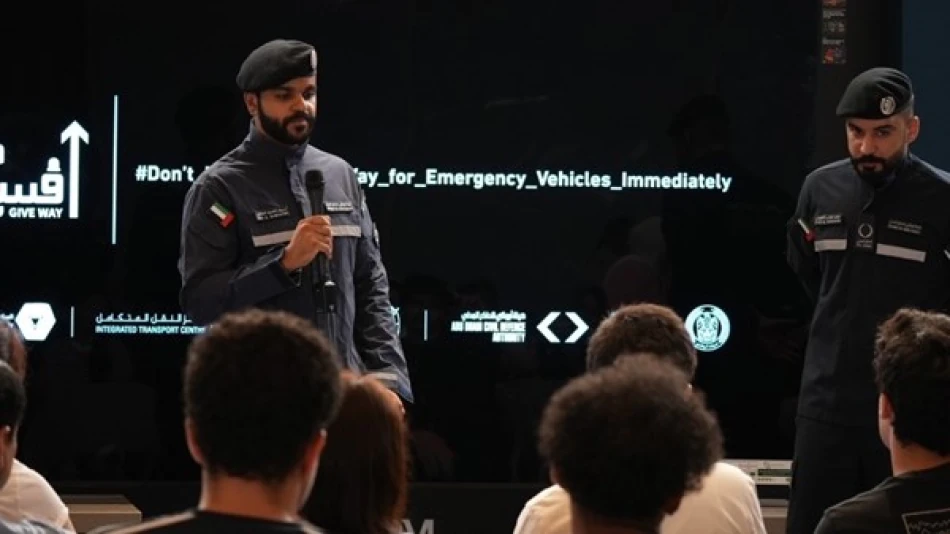
Make Way: Raising Awareness on Importance of Yielding to Emergency Vehicles
Abu Dhabi Launches Major Public Campaign to Clear Emergency Vehicle Pathways
Abu Dhabi authorities have rolled out an intensive community awareness initiative targeting one of the most critical yet overlooked aspects of urban safety: ensuring emergency vehicles can navigate through traffic swiftly. The "Clear the Way" campaign represents a coordinated effort between multiple government agencies to address response time delays that can mean the difference between life and death in emergency situations.
Multi-Agency Collaboration Targets Traffic Response Times
The Abu Dhabi Police General Command spearheaded the two-day public engagement event at Reem Mall, bringing together the Abu Dhabi Civil Defence Authority, the Department of Health - Abu Dhabi, and Emirates Driving Company. This collaborative approach signals the government's recognition that emergency response effectiveness depends heavily on public cooperation and awareness.
The campaign specifically addresses six critical scenarios drivers commonly encounter when emergency vehicles approach: traffic light intersections, roundabouts, internal roads, and highways. Each situation requires different tactical responses, and the initiative provides practical guidance for safe and efficient lane clearing.
Legal Consequences Drive Compliance Messaging
Beyond educational outreach, the campaign emphasizes the legal penalties associated with failing to yield to emergency vehicles. This dual approach of education and enforcement reflects successful traffic safety strategies implemented in other Gulf states, where combining awareness with clear consequences has proven effective in changing driver behavior.
The Civil Defence Authority's participation underscores a crucial reality: every second counts during emergencies. Fire and medical response times directly correlate with survival rates in cardiac events, fires, and trauma situations, making public cooperation a literal matter of life and death.
Building Long-Term Safety Culture Through Youth Engagement
The campaign's inclusion of children's art workshops demonstrates strategic thinking about long-term behavioral change. By targeting young audiences with simplified, engaging messaging, authorities are investing in a generation that will internalize emergency response cooperation as a civic responsibility rather than a legal obligation.
This approach mirrors successful public safety campaigns in Singapore and other well-governed city-states, where early education creates lasting cultural shifts around traffic safety and emergency preparedness.
Regional Context and Urban Planning Implications
Abu Dhabi's initiative comes as Gulf cities experience rapid population growth and increasing traffic density. The UAE's urban centers face unique challenges with diverse driving cultures and varying levels of traffic law familiarity among residents from different countries.
The campaign's timing also reflects broader smart city initiatives across the Emirates, where efficient emergency response systems are viewed as essential infrastructure for maintaining Abu Dhabi's position as a regional business and tourism hub. Poor emergency response capabilities can impact everything from insurance rates to international safety ratings that influence business location decisions.
Measuring Success Beyond Awareness
The true test of this campaign will be measurable improvements in emergency vehicle response times and reduced traffic-related delays during critical situations. The multi-platform approach, spanning shopping centers and community venues, suggests authorities are serious about reaching diverse demographic groups rather than relying solely on traditional media channels.
The initiative positions Abu Dhabi as proactive in addressing urban safety challenges before they become critical problems, contrasting with cities that implement such measures only after high-profile incidents or systematic failures in emergency response.
Most Viewed News

 Layla Al Mansoori
Layla Al Mansoori






